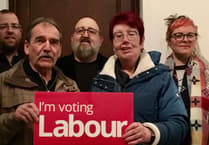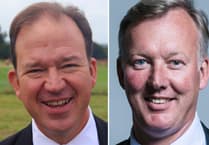The leader of Herefordshire Council has written to Prime Minister Rishi Sunak asking for “immediate financial assistance” to keep the council from going way over-budget and help it maintain services.
Coun David Hitchiner warns in his letter of “significant financial challenges in the continued delivery of services and improvements”.
He had earlier warned that the council’s revenue budget deficit could rise to £57 million by 2026/27, but on Monday he warned this “could turn out to be worse”.
It is “becoming impossible to maintain even services to our residents and achieve a balanced budget”, he writes.
The Chancellor’s autumn statement last week enabled councils to raise by up to five per cent, up from three per cent, the amount they can increase council tax without a referendum.
But even this ” will not even cover normal inflationary costs, let alone those presently in play”, Coun Hitchiner’s letter says.
Without government help, “we shall need to take extremely difficult decisions about which vital services to reduce further or stop entirely,” he warns.
The letter reads in full: ‘‘As Leader of Herefordshire Council, I write to highlight our concern regarding the financial crisis currently facing local government.
‘‘Our council, alongside all local authorities, faces significant financial challenges in the continued delivery of services and improvements.
‘‘Without immediate financial assistance to offset the impact of double-digit inflation and fuel costs on our already strapped services, the council’s ability to maintain a financially sustainable and resilient service position is at real risk.
‘‘Without adequate, sustainable Government funding we anticipate an inflation driven budget gap of more than £22 million in 2023/24. Prior to the Autumn Statement, we calculated that this would rise to around £57 million by 2026/27, but given the delayed but continuing policy of austerity confirmed in last week’s Autumn Statement, this could turn out to be worse.
‘‘The impact of inflationary costs in every service area, and growth in demand for child and adult social care services, means that it is becoming impossible, especially in the medium and long term, to maintain even the skeletal levels of remaining general and technical services to our residents and achieve a balanced budget.
‘‘The fractional shift proposed in our ability to raise income through local taxation will not address the funding issues we are experiencing here in Herefordshire. The level of increase you allow will not even cover normal inflationary costs let alone those presently in play.’’
He want on to say Herefordshire has the lowest median earnings in the West Midlands and yearly household income is below the England average.
‘‘We have significant areas of deprivation, with fuel, childhood and food poverty being of particular concern.
‘‘Alongside this we have higher than the regional average house prices and rental costs and, with a sparse and evenly distributed population, we are the only authority in England to meet the definition of ‘Rural’.
‘‘This means our baseline services are far more expensive to deliver to all than is the case elsewhere.
‘‘With or without council tax rising to the maximum allowed, we shall also need to take extremely difficult decisions about which vital services to reduce further or stop entirely. As you would expect, we are considering where we can lawfully make charges for our services, but as I’m sure you are aware, such flat tariff charging inevitably has the greatest impact on the most vulnerable in our communities and those least equipped to pay.
Our poorest residents, many of whom are already struggling to cover bills during a cost of living crisis, potentially face a treble whammy. Increases in council tax, fewer services and increased charges for those they use. This is unfair and unacceptable.
Prime Minister, from your time as Chancellor, you already know that local government consistently demonstrates the ability to carry out many important functions on behalf of central government – dealing with the Covid pandemic, helping meet carbon reduction targets, stimulating the local economy, support for refugees, and providing emergency response at a local level.
Our ability to continue to do this is set to be severely limited as these areas form parts of the few non-statutory service areas available to us to deliver further savings. This, right at the time when these same staff and their skills are what your government signals are central to your growth and recovery ambitions.
The council is already working hard to maximise its own funds and any opportunities for external funding to meet the needs of the most vulnerable and those in greatest need – and we know that those needs are only going to grow through continued austerity.
Our Council Tax Reduction Scheme is one of the most generous in the country recognising the level of wages in the county; we have a network of community hubs offering information, advice and support to residents and now doubling up as warm spaces for the winter. We continue to maximise the use of the Household Support Fund, quickly mobilising and funding a network of voluntary and community organisations to support those in greatest need and our Holiday Activities and Food Programme provides support for families on low incomes with over 1,000 children taking part in the summer activities.
While we are carefully considering every element of our services to make savings and identify opportunities to increase and generate additional income, without a fundamental change in either funding solutions or in our statutory obligations, your government places all local councils in a circle of obligation and commitment which it is impossible for us to square.
The continued uncertainty over Central Government funding, including continued delays to the fair funding review, no promised multi-year deal for local government, no review of council tax banding and national changes in policy – particularly adult social care reforms – makes it all but impossible to plan for the future – even a future of managed decline – with any certainty.
Surely part of the much needed economic and political reset is a resetting of the relationship between central and local government. We each have our important parts to play and we are more than ready to recognise and appreciate the important functions of government which must continue to be managed for the nation from Westminster.
What we are seeking now is a sufficient level of sustained funding from Westminster. This is essential to allow us to continue to deliver vital and much valued services to the most vulnerable in our communities so that we can effectively plan services for our rural county into the future




